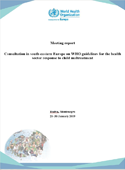Meeting report: Consultation in south-eastern Europe on WHO guidelines for the health sector response to child maltreatment (2019)

Download
Meeting report
Budva, Montenegro, 29–30 January 2019
A lack of safe and nurturing relationships in childhood is thought to adversely affect neurodevelopmental change, and in turn, the emotional, cognitive and behavioural development of a child. Adverse childhood experiences are linked both with a propensity for increased violence later in life and with health-harming behaviours, such as alcohol and drug misuse, physical inactivity, depression and self-harm. In the WHO European Region, the prevalence of child maltreatment ranges from 9.6% for sexual abuse to 22.9% for physical abuse and 29.1% for mental abuse. A consultation on the forthcoming WHO guidelines for the health sector response to child maltreatment, held in Budva, Montenegro on 29 and 30 January 2019, brought together national experts from the health and welfare sectors of selected Member States of the WHO European, including the south-eastern sub region, and representatives of WHO headquarters, the WHO Regional Office for Europe, the United Nations Children’s Fund (UNICEF) and other stakeholders. Participants commented on the INSPIRE package and the guidance currently in preparation by WHO, namely the WHO guidelines for the health sector response to child maltreatment and the WHO pocketbook of primary care for children, and shared details of their current child protection systems, legislation and policy for the identification, treatment and reporting of suspected child maltreatment and examples of effective intersectoral working.



